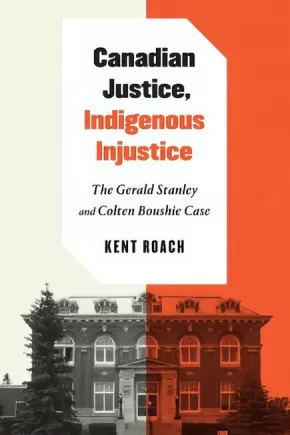Kent Roach
Kent Roach is Professor of Law and Prichard-Wilson Chair of Law and Public Policy at the University of Toronto Faculty of Law. He is a graduate of the University of Toronto and of Yale, and a former law clerk to Justice Bertha Wilson of the Supreme Court of Canada. Professor Roach has been editor-in-chief of the Criminal Law Quarterly since 1998. In 2002, he was elected a Fellow of the Royal Society of Canada. In 2013, he was one of four academics awarded a Trudeau Fellowship in recognition of his research and social contributions. In 2015, he was appointed a Member of the Order of Canada. In 2016, named (with Craig Forcese) one of the top 25 influential lawyers in Canada (change-maker category) by Canadian Lawyer. He was awarded the Molson Prize for the social sciences and humanities in 2017.
He is the author of 14 books including Constitutional Remedies in Canada (winner of the Owen best book Prize); Due Process and Victims’ Rights (short listed for the Donner Prize), The Supreme Court on Trial (same); (with Robert J. Sharpe) Brian Dickson: A Judge’s Journey (winner of the Dafoe Prize) and The 9/11 Effect: Comparative Counter-Terrorism (winner of the Mundell Medal) and (with Craig Forcese) False Security: The Radicalization of Canadian Anti-Terrorism (winner of the Canadian Law and Society Association best book prize). He is the author of the Criminal Law and Charter volumes in Irwin Law’s essentials of Canadian law series. His 14th book is Canadian Justice, Indigenous Injustice: The Gerald Stanley/Colten Boushie Case. He is the co-editor of 13 collections of essays and 3 casebooks including most recently Comparative Counter-Terrorism published by Cambridge University Press in 2015. He has also written over 200 articles and chapters published in Australia, China, Hong Kong, India, Israel, Italy, Japan, Singapore, South Africa, the United Kingdom and the United States, as well as in Canada.
Professor Roach has served as research director for the Goudge Inquiry into Pediatric Forensic Patholology and for the Commission of Inquiry into the Investigation of the Bombing of Air India Flight 182. In both capacities, he edited multiple volumes of research studies. He served on the research advisory committee for the inquiry into the rendition of Maher Arar and the Ipperwash Inquiry into the killing of Dudley George. He also served as volume lead for the Truth and Reconciliation Commission's Report on the Legacy of Residential Schools. He has been a member of Canadian Council of Academies expert panels on policing and subsequently on Indigenous policing.
Professor Roach has won awards for his pro bono work and contributions to civil liberties. He has represented Aboriginal and civil liberties groups in many interventions before the courts, including Gladue, Wells, Ipeelee and Anderson on sentencing Indigenous offenders, Latimer on mandatory minimum sentences, Stillman, Dunedin Construction, and Ward on Charter remedies, Golden on strip searches, Khawaja on the definition of terrorism and Corbiere and Sauve on voting rights. He is involved with the Asper Centre for Constitutional Rights.
Books (1)
Synopsis:
Putting Gerald Stanley's acquittal for killing Colten Boushie in the context of Canada's colonial and systemic discrimination against Indigenous peoples.
In August 2016 Colten Boushie, a twenty-two-year-old Cree man from Red Pheasant First Nation, was fatally shot on a Saskatchewan farm by white farmer Gerald Stanley. In a trial that bitterly divided Canadians, Stanley was acquitted of both murder and manslaughter by a jury in Battleford with no visible Indigenous representation.
In Canadian Justice, Indigenous Injustice Kent Roach critically reconstructs the Gerald Stanley/Colten Boushie case to examine how it may be a miscarriage of justice. Roach provides historical, legal, political, and sociological background to the case including misunderstandings over crime when Treaty 6 was negotiated, the 1885 hanging of eight Indigenous men at Fort Battleford, the role of the RCMP, prior litigation over Indigenous underrepresentation on juries, and the racially charged debate about defence of property, self-defence, guns, and rural crime. Drawing on both trial transcripts and research on miscarriages of justice, Roach looks at jury selection, the controversial "hang fire" defence, how the credibility and beliefs of Indigenous witnesses were challenged on the stand, and Gerald Stanley's implicit appeals to self-defence and defence of property, as well as the decision not to appeal the acquittal. Concluding his study, Roach asks whether Prime Minister Justin Trudeau's controversial call to "do better" is possible, given similar cases since Stanley's, the difficulty of reforming the jury or the RCMP, and the combination of Indigenous underrepresentation on juries and overrepresentation among those victimized and accused of crimes.
Canadian Justice, Indigenous Injustice is a searing account of one case that provides valuable insight into criminal justice, racism, and the treatment of Indigenous peoples in Canada.
Reviews
"In a meticulously researched and documented analysis of the trial of Gerald Stanley for the killing of Boushie in 2016, Roach exposes a whole system designed to maintain inequality between Indigenous and non-Indigenous Canadians." - The Tyee
"This was a book that needed to be written. Roach, despite various reasons to be pessimistic about the future, offers practical suggestions on how the situation of Canadian justice and Indigenous injustice can be improved. But he admits himself that even these suggestions do not go far enough in rectifying the situation; this instead will take a wholescale shift in Canadian norms and values, not just in the judicial system. I wholeheartedly recommend this book to readers, both expert and general." - British Journal of Canadian Studies
Additional Information
336 pages | 6.00" x 9.00" | Paperback






